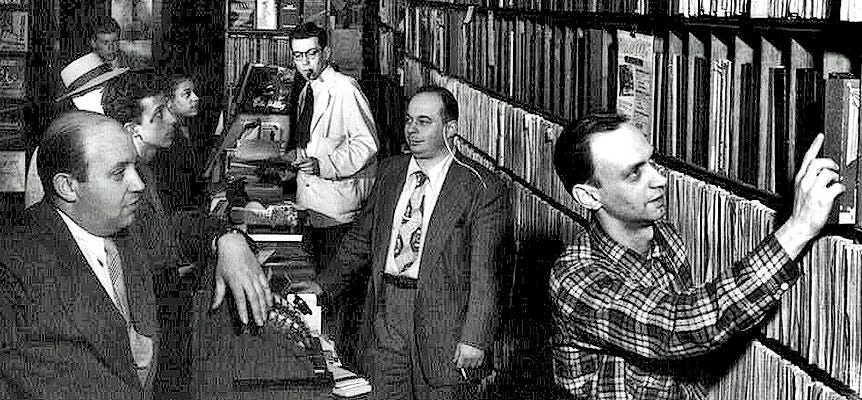Milt Gabler, innovative record producer, was born 112 years ago today
Commodore Record Shop, 1947
Left to right: Milt Gabler, Herbie Hill, Lou Blum and Jack Crystal
Photo by William Gottlieb
Milt Gabler, innovative record producer, was born 112 years ago today.
Gabler was responsible for many innovations in the recording industry of the 20th century.
Born in Harlem, Gabler, at 15, began working in his father's business, the Commodore Radio Corporation, a radio shop located on East 42nd Street in New York City. By the mid-1930s, Gabler renamed the business the Commodore Music Shop, and it became a focal point for jazz fans and musicians alike.
In 1933, Gabler began buying up unwanted copies of recordings from the record companies and resold them — making him the first person to deal in reissues. He was also the first to sell records by mail order and also the first to credit all the musicians on the recordings.
Gabler started up a specialty label UHCA, (United Hot Clubs of America), in about 1935 to reissue selected 78 r.p.m. sides previously released by other companies. He was able to secure many important jazz records, including the 1931 Joe Venuti-Eddie Lang all star session (from ARC), Bessie Smith's final session (from OKeh), a number of Frank Trumbauer, Bix Beiderbecke and Miff Mole sides (also from OKeh).
These reissues were from the original 78 stampers and were instrumental in spreading the concept of collecting classic performances from the past. A number of Paramount and Gennett sides were dubbed from clean copies and issued on UHCA and the sound was surprisingly good for a dubbing.
In 1937, he opened a new store on 52nd Street, and set up a series of jam sessions in a neighboring club, Jimmy Ryan's. Some of these he began recording, setting up his own record label, Commodore Records. His role as a music producer soon superseded his other activities and he recorded many of the leading jazz artists of the day.
One regular customer, Billie Holiday, found her record company, Columbia, resisting her appeals to release the song, "Strange Fruit," so she offered the song to Gabler.
After getting the necessary permission, he released her recording on Commodore in 1939, boosting her career and issuing what, sixty years on, Time magazine named “Song of the Century.” The success of Commodore Records inevitably led to an offer to join a major record label. He was recruited to work for Decca Records in 1941, leaving his brother-in-law, Jack Crystal, father of Billy Crystal, to run Commodore.
Gabler was soon working with many of the biggest stars of the 1940s, producing a series of hits including Lionel Hampton’s “Flying Home,” Billie Holiday’s “Lover Man” and The Andrews Sisters’ “Rum and Coca-Cola,” as well as being the first to bring Louis Armstrong and Ella Fitzgerald together on record.
Put in charge of Decca’s subsidiary label, Coral, he expanded his musical scope — producing hits for Red Foley, The Weavers, Peggy Lee, The Ink Spots and Sammy Davis Jr. In 1946, he produced and co-wrote Louis Jordan’s breakthrough single, "Choo Choo Ch'Boogie," a foretaste of the musical revolution around the corner.
Gabler contributed a further slice of history when he signed Bill Haley and His Comets to Decca Records. He produced their initial recording session in April, 1954, which resulted in two songs. Much of the studio time was focused on recording one song, “13 Women,” presumed more likely to be a hit. This left only ten minutes for the second song, which Gabler recorded with an unusually high sound level after the briefest of sound checks.
"Rock Around The Clock" was recorded in only two takes and changed the face of popular music. Gabler later recalled: "All the tricks I used with Louis Jordan, I used with Bill Haley. The only difference was the way we did the rhythm. On Jordan, we used a perfectly balanced rhythm section from the swing era ... but Bill had the heavy backbeat."
Commodore Records ended in 1954. However, through the late 1950s and 1960s, Gabler continued to guide the direction of Decca, writing songs and producing hit singles including Brenda Lee’s “I’m Sorry” and albums, including Jesus Christ Superstar.
Gabler also continued to produce all of the Comets' recordings for Decca until they left the label in 1959. He retired from the front line of business activity when MCA consolidated Decca with its other labels and moved the merged MCA Records to Universal City, California in 1971. But he continued to produce reissues and to collect recognition from the recording industry he helped shape. He was asked to return to MCA Records in 1973 to supervise the reissue of MCA's massive back catalog.
Gabler died in 2001 at age 90.
In 2005, Billy Crystal produced a tribute documentary and CD release — both titled, “The Milt Gabler Story.”
Here, Billie Holiday performs the controversial song Milt Gabler first recorded, “Strange Fruit”



